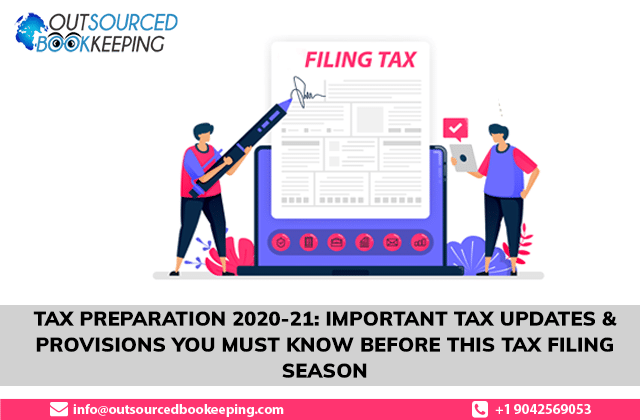As we feel a slight sigh of relief with the end of the year 2020, there is this one last thing that belongs to 2020 we all get past of: tax filing for 2020.
While the tax planning strategies remain same, there have been ample changes to tax rules and regulations in the year 2020 and this calls for a closer observation before embarking on your tax preparation. CARES Act, SECURE Act and a slew of tax changes and updates enforced for this year mean there are many more tax benefits that both individuals and business can take advantage of, for this tax season 2021.

The first step in the process is to improve awareness on the updates and plan your tax preparation and filing according to the new tax provisions rules and regulations. To help you in your cause, Outsourced Booking has decided to provide all the necessary tax information on tax updates and provisions available to you with our series of blogs on tax preparation for 2021.
While in our last blog we have already discussed the Tax Planning Strategies for an Efficient Tax Season, this blog is dedicated to the tax updates, new rules and provisions that individuals and businesses must keep in mind before tax preparation 2021.
In this blog, we are going to get you through mandatory updates and new tax rules and then we are going to delve to tax provisions for individualises and businesses. So for starters, you must file your 2020 tax returns before April 15th of 2021 and here are few key changes in tax rules you must keep in mind as you prepare for tax filing:
-
- Standard deductions are increased from $12,200 to $12,400 for single filers, from $24,400 to $24,800 for joint filers, from $18,350 to $18,650 for head of the household. Given the increase in the standard deduction, you can consider itemizing deductions in case they exceed the standard deductions.
- Income tax brackets are slightly increased up a few hundred dollars as follows:
|
Tax rate |
Single | Married | Head of household |
|---|---|---|---|
| 10% | $0–9,875 | $0–19,750 | $0–14,100 |
| 12% | $9,875–40,125 | $19,750–80,250 | $14,100–53,700 |
| 22% | $40,125–85,525 | $80,250–171,050 | $53,700–85,500 |
| 25% | $85,525–163,300 | $171,050–326,600 | $85,500–163,300 |
| 32% | $163,300–207,350 | $326,600–414,700 | $163,300–207,350 |
| 35% | $207,350–518,400 | $414,700–622,050 | $207,350–518,400 |
| 37% | Over $518,400 | Over $622,050 | Over $518,400 |
Note – Tax rates for single filers be it the unmarried or married yet filing separately remains to be the same.
Now that we have been through the change in key tax rules let us now delve into important information on tax provisions, tax credits and beneficial deductions from CARES Act and other relief programs in 2020:
- Funds received through Paycheck protection program that is used for directed business expenses like payroll, rent, utilities or mortgage payments are not allowed to be deducted from the taxable income.
- Individuals who benefited from the unemployment benefits post the CARES Act are liable to pay the taxes on the monetary benefits.
- Stimulus checks that were granted for millions of Americans will be treated as a refundable tax credit and is not counted a taxable income for the year 2020.
- Lower to middle-income families with earnings less than $56,844 can save from few hundred to a few thousand dollars through refundable tax credits from EITC (EITC) based on their filing status, income and children.
- Individuals can now write-off up to $300 of contributions made for charitable causes to qualified non-profit organizations.
- If an individual has chosen to itemize the deductions he/she can deduct medical expenses that are above 7.5% of their adjusted gross income.
- SECURE Act has now pushed the RMD age to 72 and CARES Act has allowed the elder citizen to skip the mandatory RMDS do the year 2020 and this can help them to save a lot more on tax.
- If you are self-employed individual forced to work from home-office you may claim the tax returns on business travel expenses and can claim dedication for home-office as well. This only applies to self-employed individuals but not employees.
And the list of tax provisions m credits and minor changes for tax preparation 2020 goes on. The COVID-19 pandemic has forced the federal government to make a few handy changes to help individuals and business benefit from the tax provisions and credit if you are well versed about them. However, understanding them is entirely different from unearthing new opportunities and opening doors that lead to better tax-saving opportunities. And this is why you need help from tax professionals like us at Outsourced Bookkeeping. In addition to providing remote bookkeeping and accounting services, our expert team at Outsourced Bookkeeping can help you with your tax savings and provide complete support for your tax preparation in 2020. You can contact us here: https://outsourcedbookeeping.com








